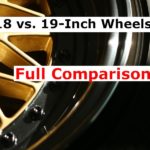17 vs. 18-Inch Wheels: Full Comparison
Upgrading to larger wheels in your vehicle is one of the fanciest things you can do easily. But is it all about the aesthetics look only or there are some other important facts to consider?
In this article, I’ll compare the most important things that you should consider before choosing the diameter of your wheels. Let’s have a look at the detailed comparison between a 17-inch and an 18-inch wheel.
17 vs. 18-Inch Wheel? What’s Better?
A 17-inch wheel is better if you consider fuel economy, smooth ride, acceleration, tire wear, and price. Aesthetic look, off-road performance, grip, and traction are comparatively better in an 18-inch wheel.
The amount of fuel consumption depends on weight and rolling resistance. Considering the parameters responsible for more fuel consumption, a 17-inch wheel will provide slightly better fuel economy.
More sidewalls of tires can ensure a smooth and comfortable ride by absorbing more bumps. 17-inch wheels have thicker sidewalls to provide a smooth ride.
Grip and traction are comparatively better in larger wheels, as they provide more tire surface and width. An 18-inch wheel is good to go if grip and traction are your main point of concern.
Better off-road performance depends on better grip and traction. 18-inch wheels generally perform better on the off tracks.
Larger wheels have extra weight that requires more work to turn. An 18-inch wheel will offer less acceleration compared to a 17-inch wheel. More braking force will also be needed for an 18-inch wheel.
Larger wheels normally provide an aesthetic look as they represent more details, but this is a relative matter and can differ from person to person.
Additional weight in both wheels and tires increases the amount of tire wear.
Larger wheels are costlier than smaller wheels as they require more materials, time, and labor.
Also read: 10 Cars Under $20K that Look Like They’re for $50K+
17 vs. 18-Inch Wheel: Fuel Consumption
An 18-inch wheel will consume slightly more fuel compared to a 17-inch wheel. So, it’s possible to get a slightly better fuel economy if you choose a 17-inch wheel instead of 18.
The weight of wheels increases according to their sizes. The bigger the wheels, the heavier they’re. More fuel and effort will be needed in this case and that’s why an 18-inch wheel has lower fuel economy than a 17-inch wheel.
Rolling resistance works against the forward motion and is bigger in bigger wheels. The amount of fuel consumption increases if rolling resistance is higher.
Trending Video: How to Easily Bring Back to Life any Old Car Battery and Save Tons of Money (click to watch)
However, moving up one size in the wheels of your vehicle doesn’t matter so much, especially when you drive a lot on the highway. But if you calculate the exact amount, you’ll definitely get advantages on fuel consumption in a 17-inch wheel.
17 vs. 18-Inch Wheel: Smooth Ride
17-inch wheels are better if you consider a smooth ride while driving your vehicle. Smaller wheels offer thicker tire sidewalls and high-profile tires that help to ensure a smooth ride experience compared to larger wheels.
Increasing the sidewall of your tires enhances the ability to absorb more bumps and imperfections of the road surface. You will feel more comfort in a 17-inch wheel as it has thicker tire sidewalls than an 18-inch wheel.
On a bad or broken road, an 18-inch wheel will produce a more dangerous impact force that may make your journey skittish and thrashing.
When it comes to noise, 17-inch wheels are quieter and less harsh than 18-inch wheels. So, it’s expected to get a smoother ride having 17-inch wheels in your car if you consider the amount of noise produced.
17 vs. 18-Inch Wheel: Grip and Traction
You’ll get more grip and traction in an 18-inch wheel. Bigger wheels offer larger tire surfaces and widths that cover more surface area on the road.
An 18-inch wheel has more tire surface and width compared to a 17-inch wheel, which ensures a larger contact patch between tire and road surface. As the contact patch increases, you’ll get a better grip having a larger wheel.
Though larger wheels provide better grip, there are some other important variables responsible for changing the amount of grip you’ll get in your vehicle. The material of the contacting surfaces, the texture of the materials, the force pressing the surfaces together, other materials between the contact surfaces can change the amount of road grip.
It’s required that soft compound tires should be wider so that the sidewall can support the weight of your car, and they have a higher coefficient of friction. Considering this, 18-inch wheels will provide better traction.
Also read: Are Cheap Tires Worth it? Are They Safe?
17 vs. 18-Inch Wheel: Off-Road
When the concern related to off-road performance comes, you need better grip and traction. An 18-inch wheel will provide comparatively better grip on rocky, muddy, sandy, snowy, and oily tracks if it’s combined with perfect off-road tires.
Larger wheels ensure to fit bigger brakes when you need to go on off roads. They also require bigger tires that improve the towing ability.
But an 18-inch wheel will provide less sidewall compared to a 17-inch wheel that may absorb fewer bumps.
All you need to do for ensuring excellent off-road performance is to make the best combination of a tire with your selected wheel. There are lots of off-road tires available in the market, and you can choose one considering your priority list.
Also read: 15 Cars that NEVER Rust (100% Galvanised)
17 vs. 18-Inch Wheel: Braking and Acceleration
18-inch wheels have poorer acceleration compared to 17-inch wheels. Larger wheels have an extra size and weight, and the engine of your vehicle requires more work to turn them properly. Having bigger tires in your vehicle, you can decrease the distance required to stop your car by applying the brakes fully. However, you have to ensure more braking force in this case if you switch from smaller to comparatively larger wheels.
The speed of your car will be compromised if you use larger wheels. The reason is that wheels of bigger diameters require heavier tires and the overall rolling resistance will be higher. So, you’ll see a decrease while accelerating your car by having 18-inch wheels.
Wheels of larger diameter affect the braking distance and time because of their extra weight and heaviness.
17 vs. 18-Inch Wheel: Appearance
18-inch wheels will provide a better look than 17-inch wheels though the choice is always individual and can vary from person to person. Bigger wheels generally improve the appearance of your car.
Many people use larger wheels in their cars as they look more presentable and increase the aesthetics of your vehicle. Larger rims can present more details and can accent your car extremely.
It’s possible to give your vehicle a sporty look by switching from old low-profile tires to bigger alloy wheels. Increasing the size of the tire can help you to add heaps to the design segment.
17 vs. 18-Inch Wheel: Tire Wear
The amount of tire wear will be more in 18-inch wheels, and you’ll get comparatively a better lifespan having 17-inch wheels in your car.
The amount of weight increases in larger wheels and tires. Increasing weight is responsible for more tire wear as you need to apply more force to move as well as to stop.
Smaller wheels also have larger sidewalls and require less force on the tire, which decreases tire wear significantly.
Also read: 16 vs. 17 Inch Wheels: Comparison & What’s Better
17 vs. 18-Inch Wheel: Price
Wheels of larger diameter cost more compared to a smaller diameter as they need more time, more metal to be prepared. So, the price of an 18-inch wheel will be higher than a 17-inch wheel.
Bigger wheels are always a bit more expensive. More materials are needed to prepare them as well as they need more time and labor. The extra amount of material, time, and labor are responsible for their extra amount.
Though, the price can vary from place to place, brand to brand. It’s better to do some research before purchasing your desired one.
For example, you need to pay $379 for a 17-inch alloy wheel suitable for Camry XLE. The amount is $371 for an 18-inch wheel when you need to deal with Chevrolet Traverse.






